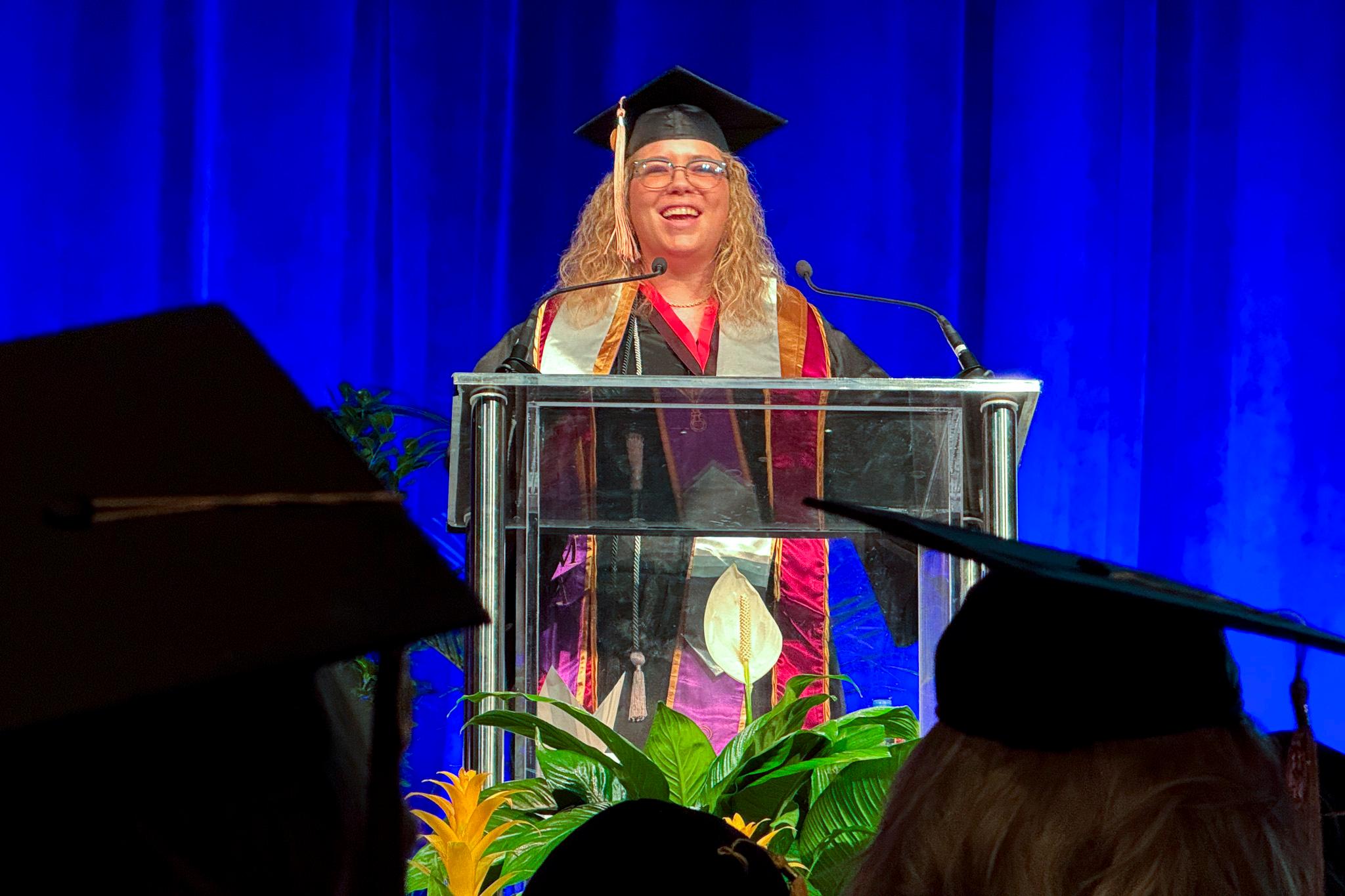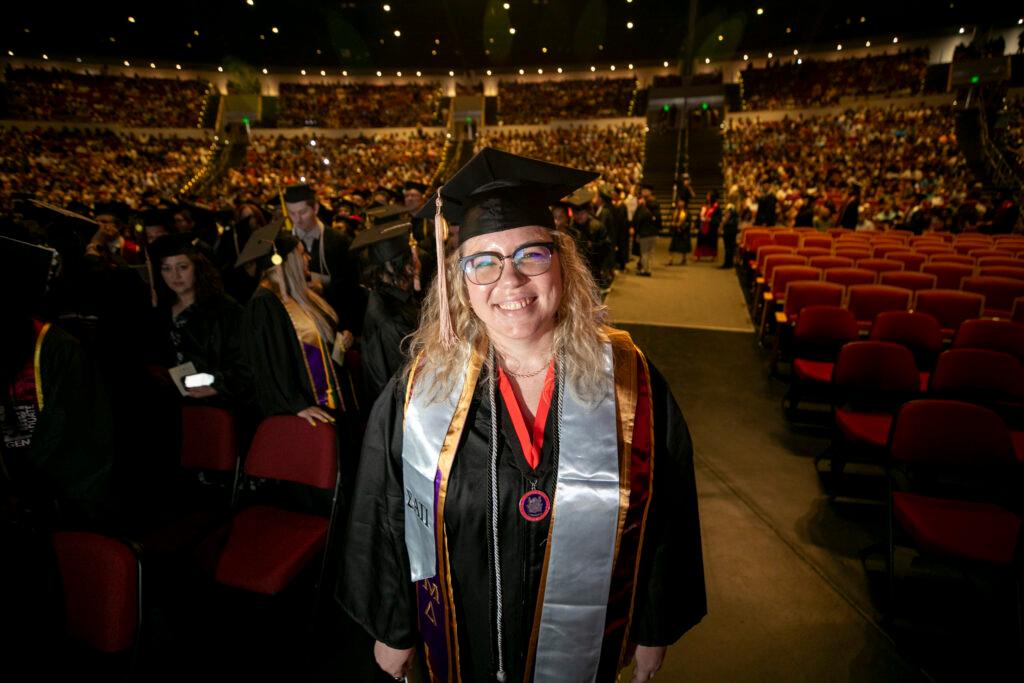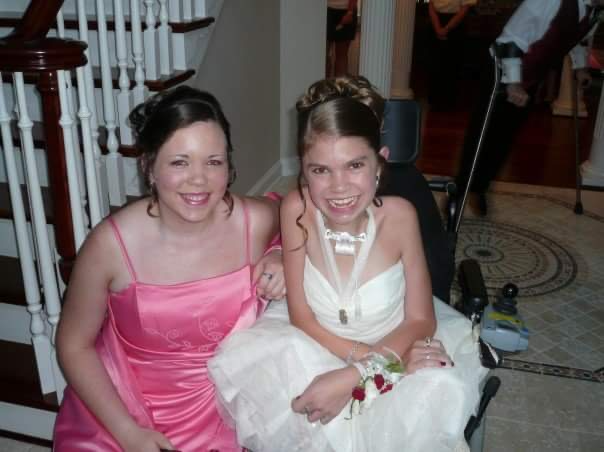
Kaitlyn McCormick’s hands are shaking ever so slightly. She’s on stage in a grand theater in Denver. She’s in black graduation robes talking to a thousand of her classmates.
“Honestly, there were days I was barely hanging on,” she tells the crowd, as she launches into her college commencement speech. “I was working full time, raising a child on my own and navigating a world that doesn't always see or hear people like me.”
What she means by "people like her” is someone who is deaf. McCormick was born with Waardenburg Syndrome Type 2. Some of her symptoms include prematurely gray hair, bright blue eyes, freckles – and hearing loss.
The 36-year-old’s journey to getting an online bachelor’s degree in Management Information Systems & Business Analytics at Colorado State University Global was not an easy one. It involved a chance purchase at a used book store, landing a job at a call center despite being deaf, texts from a unique and talented friend, and her own curiosity and perseverance.
Fourth try is the charm
On this June graduation day, McCormick tells her classmates this wasn’t her first attempt at college. It was her fourth. The first time, she said she had no idea what to do. The second time, “my heart wasn’t there.” Nothing clicked.
“I was pushed in a direction that I didn’t want to be in but I didn’t realize that yet,” she said.
Down the road, McCormick tried a third time. But there were other setbacks.
She grew up in a home with alcoholism, a toxic environment that left her with unmet needs.
“I didn’t have all of the tools in my emotional tool belt to deal with life,” she said. “I didn’t have the finances or the support system to complete my college education.”
So, McCormick applied for a job at a call center, one of the few decently paying jobs that didn’t require a college degree. She said to the manager, “just so you know, I’m deaf.” The manager walked McCormick out onto the call floor.
“I said, ‘I can talk on the phone as long as I have T-coil on, which blocks out all the other noise and only the voice of the person on the phone,’” she remembers explaining. A “T-coil” is a tele-coil technology that connects hearing aids and cochlear implants to phones.
“I’m still amazed that I had that job, but it was a good job,” McCormick laughs.
The book that changed her life
McCormick rose through the ranks at the call center and began hearing about a programming language, SQL or Structured Query Language, a way to “talk” to and manage databases that could help with client queries. She wanted to understand the analysis to build on her skill set. One day, pursuing the shelves at a used book store, she saw a book on SQL. McCormick devoured it.
“I didn’t know it then but that spark would light the fire that brought me here (to CSU Global).”
But that would take a while. McCormick became a single mom. She had to learn new things like how to find the right equipment to let her know when her baby was crying. And how to advocate for herself at work. She was at a new company now and questions from clients were getting more technical.
“I started asking people, what do you guys do in this department? What do you mean by this? What does this do?”
Eventually, one “smart guy” gave her the key to unlock what she was intensely interested in but didn’t know the name for it.
“Research data engineering,” she remembers him telling her. “Data engineering was the term I needed.”

‘It clicked’ but it wasn’t easy
As a full-time working mom, McCormick needed a fully online university. She found CSU Global. It gave her the accommodations and support she was looking for. McCormick gradually began seeing how what she was learning fit into her day-to-day work.
“It clicked,” she said. “What I was learning here wasn't just theory, it was shaping the way I thought, how I led, and how I solved problems.” But it wasn’t easy. It was exhausting.
One time, a project at work required 60 to 70 hours a week of her time. A self-described “huge nerd,” she was passionate about her work. But she had her studies, too, and also wanted to give her son the attention he needed. She began questioning whether her degree was worth it.
“I got overwhelmed – so I reached out to Kailyn.”

McCormick tears up. Kailyn Glassmacher is her best friend who has a severe form of muscular dystrophy that’s caused her to lose her hearing, speech and the use of her legs. Glassmacher wasn’t supposed to live past 19. She’s now nearly 40, with multiple degrees. Glassmacher immediately texted her back.
“She reminded me, “’Do not stop … Don't give up the rest of your life. My time is limited here, but you have the gift to not give up.’ She was right. Her life is a reminder that strength doesn't come from perfect circumstances. It comes from refusing to quit when everything tells you to.”
McCormick kept going.
“I wanted my son to be proud of me.”
She did her final college project on a big technical proposal for work. It got noticed by company executives who incorporated her ideas.
“But (the college project) also helped me figure out, 'OK, how do I make proposals, how do I make change?”
Is she done?
By the end of her commencement speech, McCormick’s 7-year-old son, in the audience with her parents, is crying – a mix of awe, pride and joy. After it’s over, he runs up to hug his mom. McCormick is beaming.
“It’s a sense of fulfillment,” she said. “It’s a sense of achievement.”
Now a data support services manager, degree in hand, McCormick thought she was done — when she saw a post from CSU Global. It was offering a Master’s in Artificial Intelligence & Machine Learning. She said she began laughing. Didn’t she want a break? Or did she want to keep going until she was done?
She wanted to keep learning.
“I probably won’t be done until I get my Doctor’s!” she laughs.









